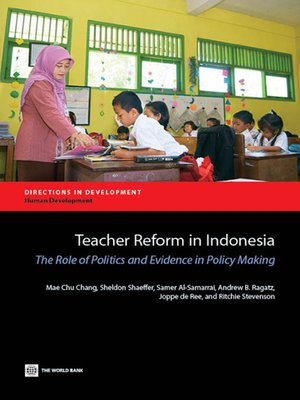Teacher Reform in Indonesia
ebook ∣ The Role of Politics and Evidence in Policy Making · Directions in Development
By Mae Chu Chang

Sign up to save your library
With an OverDrive account, you can save your favorite libraries for at-a-glance information about availability. Find out more about OverDrive accounts.
Find this title in Libby, the library reading app by OverDrive.



Search for a digital library with this title
Title found at these libraries:
| Library Name | Distance |
|---|---|
| Loading... |
One of the noteworthy global achievements of the past two decades has been the remarkable increase in
thenumber of children attending school and the number of children completing the primary cycle. As more
children start school, the focus has shifted toward the quality of their educationâon true learning, not just
schooling. The critical role played by teachers to enhance the quality of education is especially salient in a populous,
geographically dispersed, and culturally diverse country such as Indonesia. With close to three million teachers,
Indonesia has one of the largest and most diverse cadres of educators in the world. The comprehensive Teacher
and Lecturer Law, approved by the Indonesian government in 2005, radically reformed the management and
development of those teachers. Teacher Reform in Indonesia: The Role of Politics and Evidence in Policy Making features a comprehensive analysis
of the teaching profession and the impact of recent reforms, which included the doubling of a teacherâs basic
pay once he/she satisfies the conditions necessary for certificationâa factor that has improved the status
ofteachers and attracted better candidates to teacher training institutions. This book provides a description of
the political and economic context in which the reform was developed and implemented as wellas an analysis
of how the reform affected teacher quality and student outcomes. The bookâs framework promotes an
approach to reforms based on improving the nature of teacher recruitment; preservice education; induction,
mentoring, and probation; formal certification; continuing professional development; teacher performance
appraisal; and ongoing career development. The recent history of teacher reform in Indonesia can inform other countries seeking to improve their
educational systems and, ultimately, the success of their teachers and students. This book should therefore be
of particular interest to Ministries of Education that contemplate similar reforms and development agencies and
practitioners that seek to support country efforts to strengthen the teaching profession.







